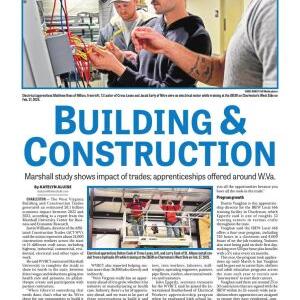It might get easier for West Virginia �����Ƶ� and the rest of the country �����Ƶ� to go nuclear.
That�����Ƶ�s the idea behind the ADVANCE Act, co-led by Sen. Shelley Moore Capito, R-W.Va., that the Senate advanced last Tuesday, June 18, in an 88-2 vote, to President Joe Biden, who is expected to sign it into law.
The Accelerating Deployment of Versatile, Advanced Nuclear for Clean Energy Act backed by the rest of West Virginia�����Ƶ�s congressional delegation and included in the Fire Grants and Safety Act is aimed at advancing nuclear development.
That�����Ƶ�s a goal that has climate advocates divided on whether nuclear is a safe enough option for decarbonization alongside other forms of energy that avoid direct carbon dioxide emissions and rely on technology that, unlike small modular reactors eyed by Capito and other nuclear supporters, are market-ready and have proven themselves at commercial scale.
�����Ƶ�It�����Ƶ�s hand in hand with the all-of-the-above energy plan that I�����Ƶ�ve always talked about,�����Ƶ� Capito, the top Republican on the Senate Environment and Public Works Committee, said during a news conference Thursday.
The ADVANCE Act:
- Directs the Nuclear Regulatory Commission to improve its ability to qualify and license accident-tolerant fuels and advanced nuclear fuels
- Instructs the NRC to establish an accelerated licensing review process to site and construct reactors at existing nuclear sites
- Expands the scope of the NRC�����Ƶ�s mission statement to see that licensing does �����Ƶ�not unnecessarily limit�����Ƶ� the benefits of nuclear energy technology to society
- Creates prizes for advanced nuclear reactor licensing
�����Ƶ�The ADVANCE Act will give our regulators new tools to accelerate the licensing of next-generation nuclear technologies while reducing regulatory costs and hurdles,�����Ƶ� the American Nuclear Society, an international professional organization of engineers, scientists, health care providers and other supporters of nuclear technology, said in a statement Tuesday.
Capito said the ADVANCE Act could ease the transition of abandoned coal-fired power plants in communities that have lost jobs amid the energy transition.
�����Ƶ�[T]hey can use the transmission that�����Ƶ�s already there,�����Ƶ� Capito said of small modular reactors setting up on former coal plant sites. �����Ƶ�So it�����Ƶ�s an environmental win, it�����Ƶ�s an economic win �����Ƶ� it�����Ƶ�s a national security win, as well.�����Ƶ�
Public health and national security risks feared
But the ADVANCE Act hasn�����Ƶ�t erased doubts that nuclear development introduces unacceptable public health and national security risks.
The type of uranium being produced with federal subsidies to fuel advanced nuclear reactors creates proliferation and terrorism risks that governments haven�����Ƶ�t considered, a study led by Massachusetts Institute of Technology researchers and published this month in the peer-reviewed journal Science found.
Edwin Lyman, director of nuclear power safety at Union of Concerned Scientists, a national science advocacy group, said in a statement Monday that the ADVANCE Act passage would increase the danger to people living downwind of nuclear facilities from a severe accident or terrorist attack and make it more difficult for communities to �����Ƶ�prevent risky, experimental reactors from being sited in their midst.�����Ƶ�
Lyman was one of the authors of the Science-published study.
�����Ƶ�Every dollar wasted on unproven, enormously expensive nuclear energy schemes is a dollar not invested in truly clean, safe and increasingly efficient wind and solar power,�����Ƶ� Wenonah Hauter, executive director of national progressive environmental and climate group Food & Water Watch, said in a statement criticizing support from Senate Majority Leader Chuck Schumer, D-N.Y., for the ADVANCE Act.
The debate over West Virginia�����Ƶ�s potential nuclear future has focused on technology that isn�����Ƶ�t market-ready: small modular reactors. Small modular reactors are advanced nuclear reactors capable of up to 300 megawatts of electrical output. They are designed to produce power, process heat and desalinate on locations not suitable for larger nuclear plants while requiring less capital investment than bigger facilities.
West Virginia lawmakers repealed state code frowning upon nuclear power in 2022 through Senate Bill 4. The state previously held that the use of nuclear fuel and power �����Ƶ�poses an undue hazard to the health, safety and welfare�����Ƶ� of West Virginians. It bans nuclear facilities unless the proponent of a facility can prove �����Ƶ�a functional and effective national facility, which safely, successfully and permanently disposes of radioactive wastes, has been developed.�����Ƶ�
Nuclear power creates radioactive waste such as uranium mill tailings and used reactor fuel that can stay radioactive and endanger human health for thousands of years.
The West Virginia Coal �����Ƶsociation, West Virginia Citizen Action Group and West Virginia NAACP representatives were among those making cases against lifting state restrictions on nuclear power plant construction in 2022 through SB 4. West Virginia Climate Alliance, West Virginia Manufacturers �����Ƶsociation and West Virginia Chamber of Commerce leadership spoke in support of lifting the restrictions.�����Ƶ�
The version of the ADVANCE Act off to Biden�����Ƶ�s desk omitted a previously included provision of $225 million for communities impacted by nuclear closures and $100 million to clean up contaminated Tribal communities.
Department of Energy pushes nuclear development
The U.S. Department of Energy has approved cost-share awards to develop small modular reactors that are planned to be operational by the end of the decade.
The department on Monday announced a $900 million investment plan for small nuclear reactor development �����Ƶ� an announcement agency Secretary Jennifer Granholm said would �����Ƶ�support early movers in the nuclear sector.�����Ƶ�













